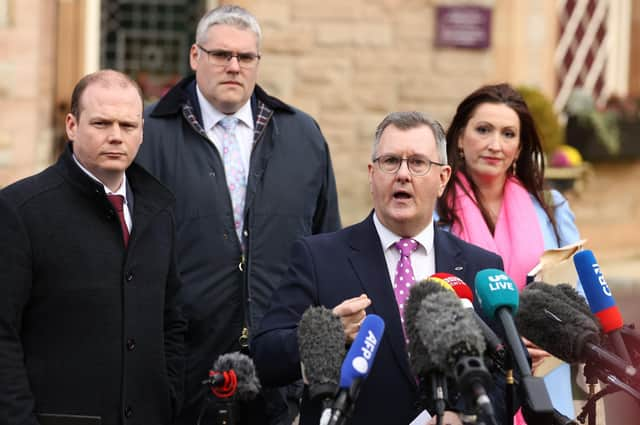Owen Polley: The DUP should give its view on the Windsor Framework, not hide behind consultations and panels


These criteria seemed to be deliberately ambiguous, but we were told that they would be the sole basis for any final decision.
Why, then, has Sir Jeffrey Donaldson appointed an eight person ‘panel’ to conduct a ‘consultation process within Northern Ireland’ on the Windsor Framework?
Advertisement
Hide AdAdvertisement
Hide AdThe group is supposed to contain “independent thinkers who have standing within the broader community.” Largely, though, it’s made up of DUP politicians, past and present, with an extra couple of representatives from law and business.
It’s not likely to uncover many perspectives that were not already obvious from the party’s internal discussions.
Appointing this panel, which is due to report back before the end of March, makes it look like the DUP is trying to achieve one of two things. Either it is delaying making its decision, or it wants to distance its leadership from the process of reaching it.
A thorough ‘consultation’ might make a controversial verdict on the framework easier to explain to voters, particularly if it’s conducted by a group that includes figures like Peter Robinson.
Advertisement
Hide AdAdvertisement
Hide AdIt also shifts the spotlight away from Sir Jeffrey Donaldson.
That view may be too cynical, but we know already that the DUP will struggle to make a convincing argument that the Windsor Framework meets its tests. They were worded vaguely, but, even if Sunak’s deal potentially makes trade easier, it entrenches the protocol and the Irish Sea border. It does not ensure there will be ‘no checks’ on goods moving here from Great Britain, as the DUP demanded in one of its less equivocal stipulations.
Sir Jeffrey argued recently that the government should stop exaggerating the achievements of the Windsor Framework. “I think we do need … clarity,” he said, “Less of the oversell and more of the reality. I suspect the truth lies somewhere in the middle of all of this.”
That’s a valid point. But, at the same time, many of the problems with this deal became apparent quite quickly.
Advertisement
Hide AdAdvertisement
Hide AdWe found out almost immediately, for example, that Northern Ireland remained in the single market for goods. Despite all the government’s claims, that meant that EU laws rather than British rules would cover product standards here, except, ironically, when it came to medicines and groceries.
Previously it seemed that food was the very last thing that Brussels would compromise on, yet now we have something like ‘dual regulation’ for supermarkets, simply because the UK unilaterally imposed grace periods and refused to bow to the EU’s orders.
There are other issues that are more complicated, because the framework was unveiled by the government through a ‘command paper’ that was basically a sales pitch. Many of the assertions it made are difficult to back up in the legal texts, and some were contradicted by the EU.
Other factors - Brussels continuing to regulate goods, or the need for simplified customs declarations - were apparent almost from publication.
Advertisement
Hide AdAdvertisement
Hide AdThe DUP doesn’t have an easy decision, when it comes to its response to the Framework, and nor do other unionists. The deal removes some of the more scandalous features of the protocol, like the threat to bar UK medicines, bans on certain British food products and customs forms for private parcels.
It’s clear that the government wanted to make a lot of the sea border’s effects invisible to consumers, and let traders quietly deal with a reduced volume of schemes and paperwork.
That’s a little dishonest but not entirely insignificant. Its aim is to prevent aspects of daily life in Northern Ireland from becoming increasingly different from the rest of the UK, and ever more indistinguishable from the Republic. These things are easy to mock, but they are part of people’s sense of culture and belonging. Over the longer-term they dilute or strengthen political allegiances and affect our constitutional position.
It’s impossible to ignore the fact, though, that the Windsor Framework does not deliver everything that the prime minister initially claimed. Indeed, glaringly, it has left fundamental aspects of the Northern Ireland Protocol in place.
Advertisement
Hide AdAdvertisement
Hide AdWhat we need now is some honesty from the DUP. If it is prepared to move away from its ‘seven tests’, then it should be obliged to explain that decision to its voters. Is it a tactical retreat, because it thinks it can remove more aspects of the protocol in the future, or is it now resigned to Northern Ireland becoming a UK/EU hybrid permanently? Does it believe that its Stormont boycott will no longer be effective, in light of Sunak’s offer?
The government has argued that Northern Ireland will become more prosperous, if it exploits the ‘privileged access’ that the Windsor Framework provides to both the UK internal market and the EU single market. This is just an updated version of the ‘best of both worlds’ grift that the protocol’s apologists have touted since 2020.
The argument, though, that unionists are running out of leverage to reshape the sea border is difficult to refute. And the idea that Sunak’s deal will cause a revolt in the Conservative party, that may revive the NI Protocol bill, seems ever more unlikely, not least because of the DUP’s procrastination.
Sir Jeffrey Donaldson’s party has a duty to tell us what it plans to do about the Framework soon, rather than sheltering behind panels and consultations.